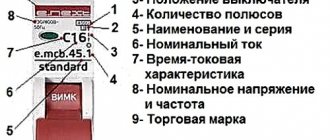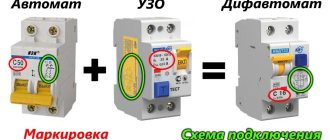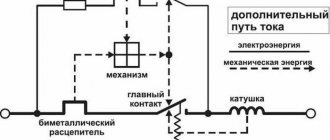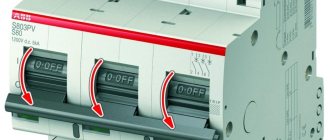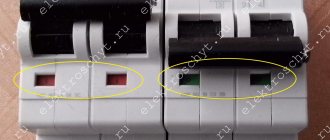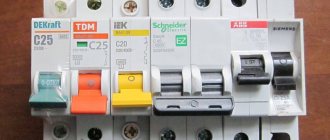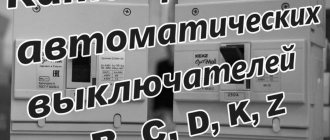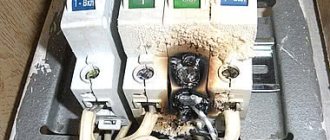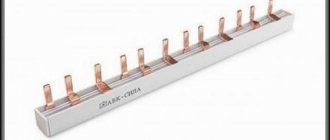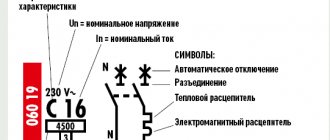Which machine should I install at 3 kW?
For consumers whose total power will not exceed 3.5 kW, we recommend using a copper cable with a cross-section of 2.5 kW. mm and protect these lines with a 16A automatic. For copper cable with a cross section of 2.5 sq. mm according to table 1.3.6 PUE long-term permissible current 27A.
Interesting materials:
How to find a person's tweet by word? How to find the zero derivational suffix in a word? How to find a post in a VK group by word? How to write a date in words? How to write the word we will arrive correctly? How to write a word correctly in general? How to write a word without problems? How to write a word and cross it out in WhatsApp? How to write the word don't know? How to write the word why?
Table for calculating the power of the machine during electrical installation work
The electrical installation work we carry out is always high quality and affordable. We can help in calculating the power of automatic machines (circuit breakers) and in their installation. How to choose a machine?
What to consider?
- first, when choosing a machine, its power
,
the total power of loads connected on a permanent basis to the automatically protected wiring/network is determined. The resulting total power is increased by the consumption coefficient, which determines the possible temporary excess of power consumption due to the connection of other, initially unaccounted for electrical appliances.
- second connection type
An example of how you can calculate the load in a kitchen
- electric kettle (1.5 kW),
- microwaves (1kW),
- refrigerator (500 Watt),
- hoods (100 watt).
The total power consumption will be 3.1 kW. To protect such a circuit, you can use a 16A circuit breaker with a rated power of 3.5 kW. Now imagine that a coffee machine (1.5 kW) was installed in the kitchen and connected to the same electrical wiring. The total power removed from the wiring when connecting all the specified electrical appliances in this case will be 4.6 kW, which is more than the power of a 16 Amp auto switch, which, when all appliances are turned on, will simply turn off due to excess power and leave all appliances without power, including the refrigerator.
Selection of machines by power and connection
| Connection type | Single phase | Single phase introductory | Three-digit treug-ohm | Three-phase star | |
| Machine polarity | Single-pole circuit breaker | Two-pole machine | Three-pole machine | Four-sleeve machine gun | |
| Supply voltage | 220 volt | 220 volt | 380 Volt | 220 volt | |
| V | V | V | V | ||
| Automatic 1A | 0.2 kW | 0.2 kW | 1.1 kW | 0.7 kW | |
| Automatic 2A | 0.4 kW | 0.4 kW | 2.3 kW | 1.3 kW | |
| Automatic 3A | 0.7 kW | 0.7 kW | 3.4 kW | 2.0 kW | |
| Automatic 6A | 1.3 kW | 1.3 kW | 6.8 kW | 4.0 kW | |
| Automatic 10A | 2.2 kW | 2.2 kW | 11.4 kW | 6.6 kW | |
| Automatic 16A | 3.5 kW | 3.5 kW | 18.2 kW | 10.6 kW | |
| Automatic 20A | 4.4 kW | 4.4 kW | 22.8 kW | 13.2 kW | |
| Automatic 25A | 5.5 kW | 5.5 kW | 28.5 kW | 16.5 kW | |
| Automatic 32A | 7.0 kW | 7.0 kW | 36.5 kW | 21.1 kW | |
| Automatic 40A | 8.8 kW | 8.8 kW | 45.6 kW | 26.4 kW | |
| Automatic 50A | 11 kW | 11 kW | 57 kW | 33 kW | |
| Automatic 63A | 13.9 kW | 13.9 kW | 71.8 kW | 41.6 kW | |
It’s better to turn to specialists than to make a mistake
We provide a guarantee for all types of services.
Call an electrician in the city of Cherkassy, all types of electrical installation.
tel.
tel. (093)251-57-61
tel.
Become our client and you will be convinced of the quality of our services.
Connecting a three-phase machine
The three-phase input circuit breaker is connected through a dinistor and a bidirectional trigger diode. The output contacts of the device are connected to the expander, and at the same time a relay is used to stabilize the input signal. The rated voltage of the device must not exceed 230 V.
The machine is connected to the drive mechanisms only through an adapter using inverting type contactors. If a low-power drive device is put into operation, then in this case the relay can be used at 120 V. The connection procedure depends on the specific model of the three-phase machine and its operating characteristics.
Selecting a machine by rated current
The considered formulas are widely used in calculations of the input circuit breaker. Using one of them - I = P/209 with a load P of 1 kW, the current strength for a single-phase network is 1000 W/209 = 4.78 A. The result can be rounded up to 5 A, since the actual voltage in the network is not always corresponds to 220 V.
Thus, the current strength was 5 A per 1 kW load. That is, a device with a power of more than 1 kW cannot be connected, for example, to an extension cord marked 5 A, since it is not designed for higher currents.
Circuit breakers have their own current rating. Based on this, it is easy to determine the load that they can withstand. There is a table to simplify the calculations. A machine rated 6 A corresponds to a power of 1.2 kW, 8 A – 1.6 kW, 10 A – 2 kW, 16 A – 3.2 kW, 20 A – 4 kW, 25 A – 5 kW, 32 A – 6, 4 kW, 40 A – 8 kW, 50 A – 10 kW, 63 A – 12.6 kW, 80 A – 16 kW, 100 A – 20 kW. Based on the same ratings, calculations are made for the machine's power at 380V.
The 5 A per 1 kW method can also be used to determine the current strength that appears in the network when any household appliances and equipment are connected to it. In calculations, you need to use the maximum power consumption during peak loads. For this purpose, the technical characteristics of the equipment taken from the passport data are used. If they are absent, you can take the approximate parameters of standard electrical appliances.
The lighting group is calculated separately. As a rule, the power of lighting devices is estimated at 1.5-2 kW, so a separate machine with a rating of 10 A will be sufficient for them.
Types
The machine is selected taking into account the electrical network diagram and its needs. There are single-pole, two-pole, three-pole and four-pole devices.
Single pole
A single-pole switch is used in single-phase electrical networks. Different models have different characteristics, which determine the shutdown speed. The composition includes two release mechanisms - electromagnetic and thermal.
One is triggered when there is a short circuit, the second when the load is exceeded for a certain time. It is connected through the upper terminal, the outgoing wire is connected to the lower one. The principle of operation is the same as that of diverter machines, but the current rating is higher.
Bipolar
Used in single-phase input. The design consists of a block with two poles, which are equipped with levers and a common lock between the shutdown mechanisms. That is, the main difference from a single-pole network is that if there is a problem on any of the lines coming from it, both will be disconnected. Two-terminal networks are used in typical modern apartments.
You cannot replace one double-pole switch with two single-pole circuit breakers! This is prohibited by the PUE.
Three-pole
For three-phase networks, three-terminal and four-terminal networks are used. Such electrical networks are found in homes where food is cooked on electric stoves. To connect a three-pole circuit breaker, each terminal is connected in phase. In devices with four poles, a neutral wire is additionally used.
When installing it yourself, the ground (not the neutral) should never pass through the machine.
Comments:
Evgen
And I thought that the three-pole one is connected as phase-zero-ground, but it turns out to be like this... Live and learn! Can it be used in a panel for a single-phase network, if three circuits need to be disconnected at once?
Vasiliy
Evgen, why is it needed then? Power all three phases through a single-pole switch and they will turn off at the same time without any problems! And you'll save space on the rack.
Denis
Why can't you use a three-pole switch in a single-phase network? Disconnect phase, neutral and ground at the same time? If you place it, for example, at the input to the panel. It seems to me that this is more correct.
Alex
Denis, why do you need to disconnect the ground at the input? A three-pole switch is only
in a three-phase network, but using it in a single-phase network is possible, but impractical. Just as impractical as disconnecting the ground in the example you gave
Vladimir
Sometimes it’s useful to turn off the zero - when there is a phase imbalance, in villages all the time. But you need to tear up the ground ONLY if there is a split trans, and AFTER it.
Virtual Private Servers
One of the most prominent, in the literal sense of the word, characteristics of a circuit breaker is the characteristic that determines the number of poles of the circuit breaker.
Max
and if you need to disconnect two phases and three-pole zero will work
Leave a comment Cancel reply
Similar posts
We make holes for sockets in concrete and tiles ourselves
A few simple rules for choosing sockets and switches
How to select and connect a differential machine
Correct and convenient installation of sockets in the apartment
Principles for calculating the machine according to the cable cross-section
Calculations for a 3-phase automatic circuit breaker are carried out based on the cable cross-section. For a 25 A model, you will need to refer to the table.
| Wire cross-section, mm2 | Permissible load current based on cable material | |
| Copper | Aluminum | |
| 0,75 | 11 | 8 |
| 1 | 15 | 11 |
| 1,5 | 17 | 13 |
| 2,5 | 25 | 19 |
| 4 | 35 | 28 |
The 25 Ampere modification can be used to protect wiring or installed at the input.
For example, a copper wire with a cross-section of 1.5 mm2 with a permissible load current of 19 A is used for wiring. To prevent the cable from heating up, you will need to select a lower value - 16 A.
Electric motor 15 kW current
There are many varieties of 15 kW motors, but they all have different characteristics. Let's look at examples of such engines.
The most common examples of engines are:
- Asynchronous electric motor 4AM160S4 15/1460 380-660V;
- Electric motor 15 kW 1500 rpm;
- Electric motor 15 kW at 3000 rpm AIR160S2 and 15 kW at 1500 rpm AIR160S4;
- Electric motor AIR160S2 15.0 kW 3000 rpm AIR 160 S2;
- Electric motor 15 kW 1000 rpm AIR160M6.
All are united by two characteristics, this is a power of 15 kW and three-phase, and the type of motor - asynchronous and, of course, the presence of a contactor. Other characteristics, such as rotation speed, rotor type and brand, are all different. Electric motors of this type are designed to perform work from a network with alternating current frequency of 50 Hz and are manufactured for the following rated voltages:
For more selection options and information about machines for electric motors, see the video on the next tab.
Source
